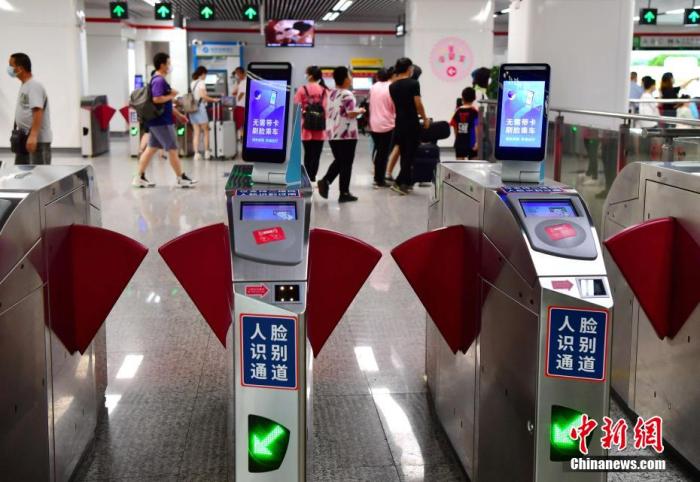(Observation of the Two Sessions) In the era of "face brushing", how to put a "safety lock on the rule of law" on personal information?
China News Agency, Beijing, March 9 (Reporter Song Jie) The work report of the Supreme People's Court and the work report of the Supreme People's Procuratorate were submitted to the Fifth Session of the Thirteenth National People's Congress for deliberation on the 8th.
Both reports mentioned the issue of judicial protection of personal biometric information.
Data map: The face recognition channel set up at Fuzhou Metro Station.
Photo by Zhang Bin
From fingerprint unlocking to face recognition, in recent years, identity recognition based on personal biometric information has been widely used, bringing convenience to daily life, while related data security incidents have also brought new challenges.
On the one hand, "face brushing" can avoid physical contact and virus transmission, save time and improve efficiency; on the other hand, once personal information is leaked and used illegally, it will cause serious damage to the basic rights of the information subject, such as dignity, personal and property safety, etc. damage.
The work report of the Supreme People's Court shows that in 2021, the theft and reselling of ID cards, address books, express delivery slips and other crimes infringing on citizens' personal information will be severely punished, and 4,098 related cases will be concluded, a year-on-year increase of 60.2%; Strictly prosecuted online defamation, insults, infringement of citizens' personal information and other crimes that seriously endangered social order and violated citizens' rights, and prosecuted 3,436 people.
Handle more than 2,000 public interest lawsuits in the field of personal information protection.
At present, the Civil Code of the People's Republic of China, the Personal Information Protection Law of the People's Republic of China, and the Provisions of the Supreme People's Court on Several Issues concerning the Application of Law in the Trial of Civil Cases Related to the Use of Face Recognition Technology to Process Personal Information, etc., together constitute personal information. Legal framework for protection.
As face recognition and other technologies have greatly improved in speed and accuracy, how to fasten the "safety lock of the rule of law" of personal information so that citizens can enjoy the convenience of the "face-swiping" era has become a new topic in China's judicial field.
In an exclusive interview with a reporter from China News Agency, Liang Bin, a postdoctoral researcher at the Development Research Institute of Fudan University, pointed out that at the legal level, it can be improved from three aspects.
First, ensure that the storage and retrieval of personal biometric information are separated.
At present, some models of Apple, Huawei and other brands have basically stored face and fingerprint information locally on the device and cannot access the Internet.
When a third-party application calls face or fingerprint information locally from the device, it will not be able to see the specific content of the face and fingerprint.
Second, ensure the right to know the records of personal biometric information.
When recording information such as face, fingerprints, walking posture, etc., the parties should be informed, and the parties have the right to refuse to be recorded; in addition, the parties should be clearly aware of the scope of application of biometric information. When the information is handed over to a third party, the third party has Obligation to inform the parties where the information will be used.
Third, an information "retention period" should be established for the recorder of personal biometric information and the third party who uses the information.
At present, most Internet platforms store personal information permanently after collecting it, and the parties cannot delete it in person.
When recording citizens’ personal information, relevant enterprises should file a record with the relevant departments, and explain the direction and duration of the use of the information.
"Generally speaking, a framework that can balance the interests of all parties should be gradually formed, so that while public rights and interests are protected, enterprises can use technologies such as face recognition to improve productivity without forming a monopoly." Liang Bin told reporters "Last year, the state began to strengthen anti-monopoly measures against Internet companies, and in recent years, China's algorithmic regulatory technology has advanced, making it a good time to build this framework," he said.
During the two sessions this year, several members put forward suggestions on protecting the security of personal information.
Tan Jianfeng, member of the National Committee of the Chinese People's Political Consultative Conference, president of the Fifth Space Information Technology Research Institute, and honorary chairman of the Shanghai Information Security Industry Association, pointed out that a national "data bank" should be established as soon as possible, and priority should be given to purchase and storage in various financial institutions, Internet companies and other enterprises. biometric data to ensure the security of key data to the greatest extent.
Pi Jianlong, a member of the National Committee of the Chinese People's Political Consultative Conference and director of Beijing Jintai Law Firm, believes that an industry association should be authorized by the government to conduct micro-management of face information protection.
In this regard, Liang Bin said that China has always encouraged enterprises to carry out independent innovation under the premise of compliance, and can implement unified management at the national level after the formation of unified norms within industries such as Internet companies, mobile phone equipment manufacturers, and financial institutions.
(over)

